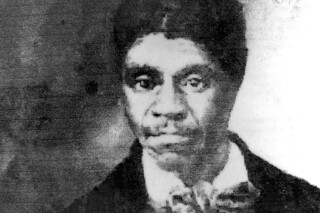Today in History: March 6, Supreme Court issues Dred Scott decision

Shown is a copy of a photograph taken in the 1800s of slave Dred Scott that was found in the historic courthouse located in Thebes, Ill. Scott, the slave whose legal fight for freedom became a landmark U.S. court ruling, is said to have done time in the dungeons below the old courthouse. (AP Photo/The Southeast Missourian)
Today in History:
On March 6, 1857, the U.S. Supreme Court, in Dred Scott v. Sandford, ruled 7-2 that Scott, a slave, was not an American citizen and therefore could not sue for his freedom in federal court.
On this date:
In 1834, the city of York in Upper Canada was incorporated as Toronto.
In 1836, the Alamo in San Antonio, Texas, fell as Mexican forces led by General Antonio Lopez de Santa Anna stormed the fortress after a 13-day siege; the battle claimed the lives of all the Texan defenders, nearly 200 strong, including William Travis, James Bowie and Davy Crockett.
In 1912, Oreo sandwich cookies were first introduced by the National Biscuit Co.
In 1933, a national bank holiday declared by President Franklin D. Roosevelt, aimed at calming panicked depositors, went into effect.
In 1944, U.S. heavy bombers staged the first full-scale American raid on Berlin during World War II.
In 1964, heavyweight boxing champion Cassius Clay officially changed his name to Muhammad Ali.
In 1970, a bomb being built inside a Greenwich Village townhouse in New York by the radical Weathermen accidentally went off, destroying the house and killing three group members.
In 1973, Nobel Prize-winning author Pearl S. Buck, 80, died in Danby, Vermont.
In 1981, Walter Cronkite signed off for the last time as principal anchorman of “The CBS Evening News.”
In 1998, the Army honored three Americans who’d risked their lives and turned their weapons on fellow soldiers to stop the slaughter of Vietnamese villagers at My Lai (mee ly) in 1968.
In 2002, Independent Counsel Robert Ray issued his final report in which he wrote that former President Bill Clinton could have been indicted and probably would have been convicted in the scandal involving former White House intern Monica Lewinsky.
In 2016, former first lady Nancy Reagan died in Los Angeles at age 94.
In 2022, a second attempt to evacuate Ukrainians from the besieged city of Mariupol collapsed as Russian attacks made it impossible to create a humanitarian corridor.
